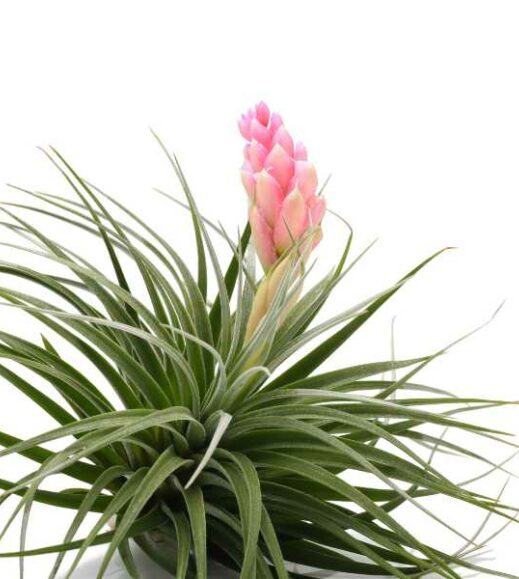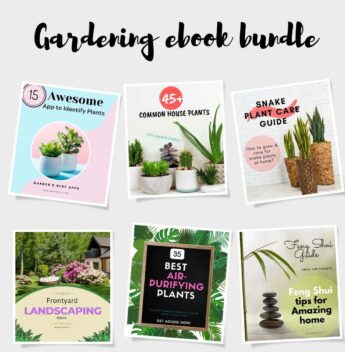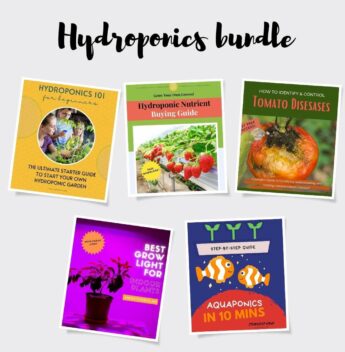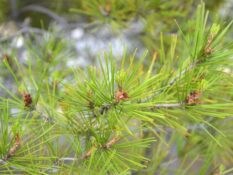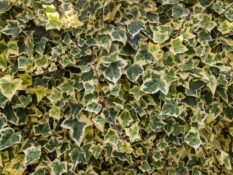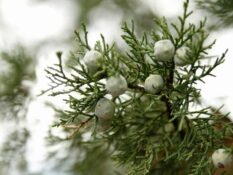Tillandsia stricta is believed to have originated in the tropical climates of Central and South America. Its natural habitat includes moist forests, rocky outcrops, and along the coastlines of its native range. The plant's long, green leaves are strap-shaped and can reach up to 20 inches long. It has a silvery-green underside and is often covered with a white bloom, which helps it to absorb moisture from the air. It produces clusters of red flowers at its base, which can be seen in late spring or early summer.
Tillandsia stricta plants require very little care compared to other houseplants. They are hardy and can survive in temperatures ranging from 50-90°F (10-32°C). They aren't fussy about sunlight but prefer indirect light or bright shade. The plant gets all its nutrients and moisture through the air, so it doesn't need to be watered like other plants. It's also important to provide good air circulation for the plant, as this will help prevent fungal and bacterial diseases.
This guide will answer most of your questions regarding growing and caring for Tillandsia stricta plants. We'll cover everything from choosing the right location to fertilizing and propagating. By the end of it, you should have all the knowledge you need to keep your air plant thriving! We'll also cover some tips and tricks to ensure it's always looking its best. Let's get started!
Do Tillandsia stricta flower? What color is the Tillandsia stricta flower?
Yes, Tillandsia stricta does flower. The flowers are usually red or purple and bloom in early summer. They have a delicate fragrance that will add an extra bit of beauty to your home. However, unlike other flowering houseplants, these flowers don't last very long and may only be visible for a few days.
When to plant Tillandsia stricta plant?
Tillandsia stricta plants can be planted at any time of the year. They prefer temperatures between 50-90°F (10-32°C), so spring or fall is the best time to plant them. Make sure to place the plants where they get plenty of indirect light and good air circulation.
Types of Tillandsia stricta: what are the recommended varieties of Tillandsia stricta plants?
There are several varieties of Tillandsia stricta available. The most popular types include:
- Tillandsia stricta pink bronze: This variety gives beautiful pink flowers.
- Tillandsia stricta midnight: This variety is dark and more blackish.
- Tillandsia Stricta Blue: This is a rare variety with bright blue leaves and flowers.
Tillandsia stricta soil requirements: What is the best soil for the Tillandsia stricta plants?
Tillandsia stricta plants don't require soil, as they obtain nutrients and moisture from the air. They prefer a humid environment, so it's best to mist the plants regularly with a water spray bottle. You can also set up an automated misting system to ensure they get the right moisture.
Adding a layer of sphagnum moss to the planting container will help retain moisture.
Tillandsia stricta light requirements: How much light does the Tillandsia stricta plant need?
Tillandsia stricta plants prefer indirect light or bright shade. Too much direct sunlight can cause leaf scorching and cause them to become dry and brittle. Make sure the plants are placed in an area where they will get plenty of indirect light and good air circulation.
Plant grow light can also supplement the natural light in your home. A grow light should be placed at least 12 inches (30 cm) away from the plant and set on a timer to ensure that the light is not too intense.
Tillandsia stricta water requirements: How often to water the Tillandsia stricta plant?
Tillandsia stricta plants don't need to be watered like other plants. Instead, they obtain their moisture and nutrients from the air. You can mist the plants regularly with a water spray bottle or set up an automated misting system.
Tillandsia stricta temperature range: What temperature can Tillandsia stricta tolerate?
Tillandsia stricta plants prefer temperatures between 50-90°F (10-32°C). They can tolerate short periods of colder temperatures but should not be exposed to frost or freezing temperatures. Make sure to place the plants in an area where they will get plenty of indirect light and good air circulation.
To protect plants during bad weather, You can use a greenhouse, cold frame, and plant protective covers to shield plants from harsh weather conditions.
Tillandsia stricta humidity: Do Tillandsia stricta like humidity?
Tillandsia stricta plants prefer a humid environment. Humidity is important for the overall health and growth of Tillandsia stricta plants. You can increase humidity around your plants by misting them regularly with a water spray bottle. You can also place a humidifier near the plants to increase the humidity in the air.
To maintain the humidity of plants around your Tillandsia stricta, you can use a humidifier or place the plants in an area with good air circulation. You can also add a layer of sphagnum moss on top of the planting container to help retain moisture around the roots.
Tillandsia stricta plant propagation: How to propagate Tillandsia stricta plant?
Several methods of propagating plants include air layering, stem cuttings, and division.
Propagating Tillandsia stricta plant from offsets
The easiest way to propagate Tillandsia kolbii is by using offsets. You can separate the small pups coming out from the parent plant when the parent plant has matured. Start by gently removing the pups from their parent and separating it into two or more plants. Replant each into a separate pot with fresh soil and water.
Potting Tillandsia stricta plant
You should plant Tillandsia stricta plant in a coarse, well-draining potting mix. You can combine equal parts perlite, peat moss, and sand. Avoid too heavy soils, as this can cause the plants to become waterlogged. For hanging baskets or terrariums, use a lightweight potting mix.
It is important to select the correct pot size or container for your Tillandsia stricta plants. The pot should be large enough to accommodate the plant's root system and allow for proper air circulation. If the pot is too small, it can restrict the growth of your plants.
How to prune Tillandsia stricta plant?
Pruning is important for the overall health and growth of Tillandsia stricta plants. Pruning helps to control the size and shape of the plant, as well as promote new growth.
To prune your Tillandsia stricta plants:
- Use clean pruning shears or scissors and cut back the dead or diseased foliage.
- Avoid cutting back too much of the healthy foliage, damaging the plant and slowing its growth.
- Prune the plant regularly to get new growth and keep the plant looking healthy.
How to fertilize Tillandsia stricta plant?
Tillandsia stricta plants require very little fertilizer. You can use a diluted liquid fertilizer every few weeks during the growing season. Choose a fertilizer specifically formulated for air plants containing the nutrients they need. Avoid fertilizers that are too rich in nitrogen, which can cause the plants to become waterlogged.
Choose a high-quality fertilizer with a balanced NPK (nitrogen, phosphorus, and potassium) ratio to fertilize your Tillandsia stricta. Some plants also benefit from adding appropriate soil amendments.
Common Tillandsia stricta diseases and how to manage Tillandsia stricta disease?
Tillandsia stricta plant is prone to a few common pests and diseases, including:
Mealybugs: Mealybugs are soft-bodied insects that feed on the sap of Tillandsia stricta plants. To control them, use insecticidal soaps or neem oil.
Fungal infections: Fungal diseases such as powdery mildew and root rot can attack Tillandsia stricta. To control them, increase air circulation around the plant or use fungicide sprays.
Aphids: Aphids are small, sap-sucking insects that can damage Tillandsia stricta plants. To control them, use insecticidal soaps or neem oil.
Spider mites: Spider mites are small, spider-like insects that can cause damage to Tillandsia stricta plants. To control them, use insecticidal soaps or neem oil.
In case of an outbreak, Use good quality insecticides and fungicides according to the instructions on the packaging. Read and follow all directions carefully before applying any chemicals or treatments to your Tillandsia stricta plant.
Takeaway on how to grow and care for Tillandsia stricta
Tillandsia stricta plants are easy to grow and care for. To ensure optimal health:
- Use a well-draining potting mix and place the plant in a bright, humid environment.
- Prune regularly to promote new growth and fertilize every few weeks with a diluted liquid fertilizer.
- Watch out for common pests and diseases and treat them quickly if necessary.
If you are looking to add more plants to your garden, explore our plant grow and care guides collection.
Join our supportive AgFunnel community of gardeners, whether you're new to gardening or a seasoned pro and share a picture of your garden.
Happy gardening!
10 reasons to grow Tillandsia stricta
1. Versatile and Attractive: Tillandsia stricta is an attractive and versatile air plant that can be used in various ways. It has wide, stiff leaves that are green on top and purple underneath, creating an attractive contrast.
2. Low Maintenance: Tillandsia stricta requires minimal maintenance and is a great choice for busy gardeners. It does not require soil to grow, as it derives its nutrients from the air rather than the roots.
3. Easy to Propagate: Tillandsia stricta is easy to propagate and can be propagated from seeds or offsets.
4. Adaptable: Tillandsia stricta is an adaptable air plant that can be grown indoors and outdoors.
5. Low Space Requirements: Tillandsia stricta requires very little space and can be grown in containers, hanging baskets, or other small spaces.
6. Easy to Manage: Tillandsia stricta is easy to manage, as it only needs to be watered and fertilized once a month.
7. Easy to Care: Tillandsia stricta is an easy-to-care-for air plant that does not require repotting or pruning.
8. Versatile Display: Tillandsia stricta can create a unique and eye-catching display. It can be mounted on walls or hung from macrame planters for an interesting and creative display.
9. Long-Lasting: Tillandsia stricta is a long-lasting air plant that can remain healthy and attractive for many years if cared for properly.
10. Affordable: Tillandsia stricta is an affordable air plant easily available at many reputable nurseries and garden centers. It is also readily available online, making it easy to find and purchase.
FAQs
What is Tillandsia stricta?
Tillandsia stricta is an attractive, low-maintenance air plant with wide, stiff leaves that are green on top and purple underneath. It is easy to care for plant that does not require soil and only needs to be watered and fertilized once a month. Tillandsia stricta can be used in various ways and is great for busy gardeners.
Where to put Tillandsia stricta?
Tillandsia stricta can be grown both indoors and outdoors. Indoors, it can be placed in a bright location away from direct sunlight. Outdoors can be grown in hanging baskets, walls, or other small spaces.
How often should Tillandsia stricta be watered?
Tillandsia stricta should be watered once a month. It is best to water it thoroughly until the leaves are completely saturated and then let it dry out before watering again. Do not overwater, as this can cause root rot. Fertilize every few weeks with a diluted liquid fertilizer.
How to get Tillandsia stricta to bloom?
Tillandsia stricta will bloom in the spring and summer months. To get it to bloom, ensure it receives enough light and water. It must also be fertilized every few weeks with a diluted liquid fertilizer. Finally, ensure that the temperature and humidity levels are kept consistent.
Does Tillandsia stricta plant like sun or shade?
Tillandsia stricta likes bright, indirect light. It should not be placed in direct sun as this can cause the leaves to burn. You can place it in an east- or west-facing window for best results. It can also be placed outdoors in a partially shaded area.
Is the Tillandsia stricta plant annual or perennial?
Tillandsia stricta is a perennial air plant. It can remain healthy and attractive for many years if cared for properly.
It is easy to care for plant that only needs to be watered and fertilized once a month. It can also be propagated from seeds or offsets and is a great choice for busy gardeners. With its long-lasting, attractive leaves and adaptability, Tillandsia stricta is an ideal choice for gardeners looking to spruce up any area of their home or garden. With the right care, it will remain a vibrant and attractive addition to your gardening space for many years.
Does the Tillandsia stricta plant come back every year?
Tillandsia stricta is a perennial plant that will come back yearly with proper care. It should be watered, fertilized once a month, and placed in bright, indirect light. It can remain healthy and attractive for many years if cared for properly.
Are Tillandsia stricta plants toxic to cats?
No, Tillandsia stricta plants are non-toxic to cats. However, if ingested, it can cause digestive upset and should be monitored for any signs of distress.
Are Tillandsia stricta plants toxic to dogs?
No, Tillandsia stricta plants are non-toxic to dogs. However, if ingested, it can cause digestive upset and should be monitored for any signs of distress.
Are Tillandsia stricta plants toxic to pets?
No, Tillandsia stricta plants are non-toxic to pets. However, if ingested, it can cause digestive upset and should be monitored for any signs of distress. It is best to keep pets away from the plant as rough play can damage it.
How cold can Tillandsia stricta plants tolerate?
Tillandsia stricta plants can tolerate temperatures down to 50 degrees Fahrenheit. However, they prefer warm temperatures and should be kept in a warm location away from cold drafts or air conditioning. It should be moved to a warmer area if exposed to temperatures below 50 degrees Fahrenheit.
How often to water the Tillandsia stricta plant?
Tillandsia stricta should be watered once a month. It is best to water it thoroughly until the leaves are completely saturated and then let it dry out before watering again. Do not overwater, as this can cause root rot. Fertilize every few weeks with a diluted liquid fertilizer.
When to fertilize Tillandsia stricta plant?
Tillandsia stricta should be fertilized every few weeks with a diluted liquid fertilizer. This will help ensure the plant receives all the essential nutrients to remain healthy and vibrant. Do not over-fertilize, as this can cause root burn or other damage.
What are the Similarities in Care Requirements Between Tillandsia stricta and Tillandsia kolbii?
When it comes to growing Tillandsia kolbii care and Tillandsia stricta, the care requirements are quite similar. Both of these air plants need plenty of bright, indirect light, regular misting or soaking, and good air circulation. Additionally, they both thrive in a warm and humid environment.
Where to buy Tillandsia stricta plant?
Tillandsia stricta is widely available in many garden centers and nurseries. You can also find them online through specialty plant retailers or buy seeds online. Some stores also offer mail-order services, which can be a great way to get your hands on the right plants for your garden. Make sure to research before purchasing any plants, as some species may not be suitable for your climate or environment.
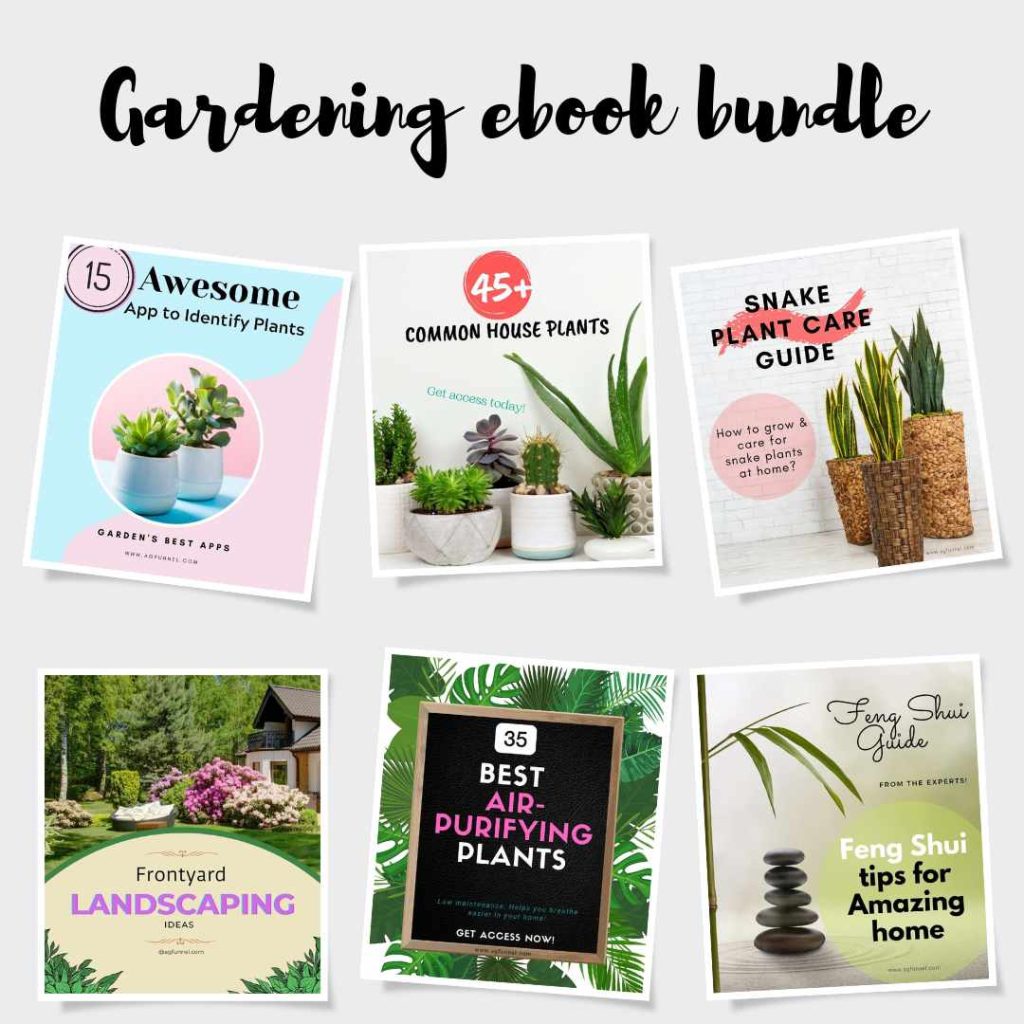
How to master gardening? Download these essential home and gardening ebooks today!

